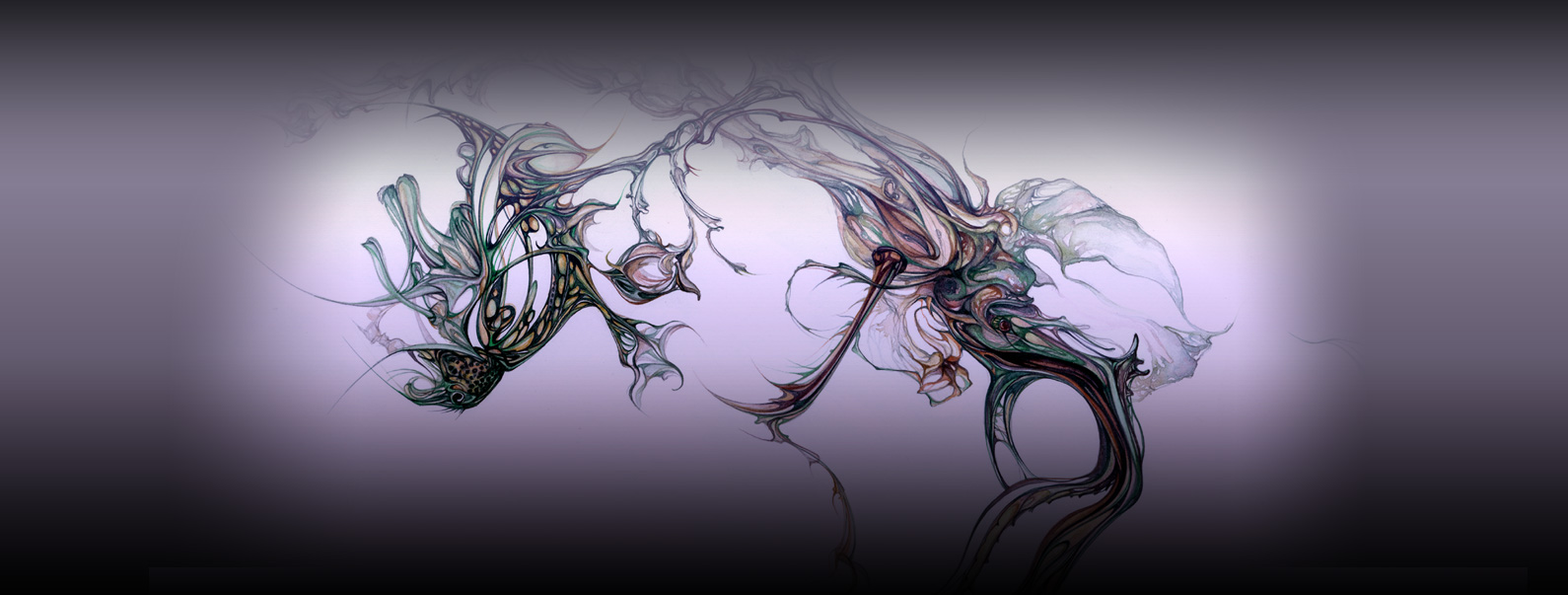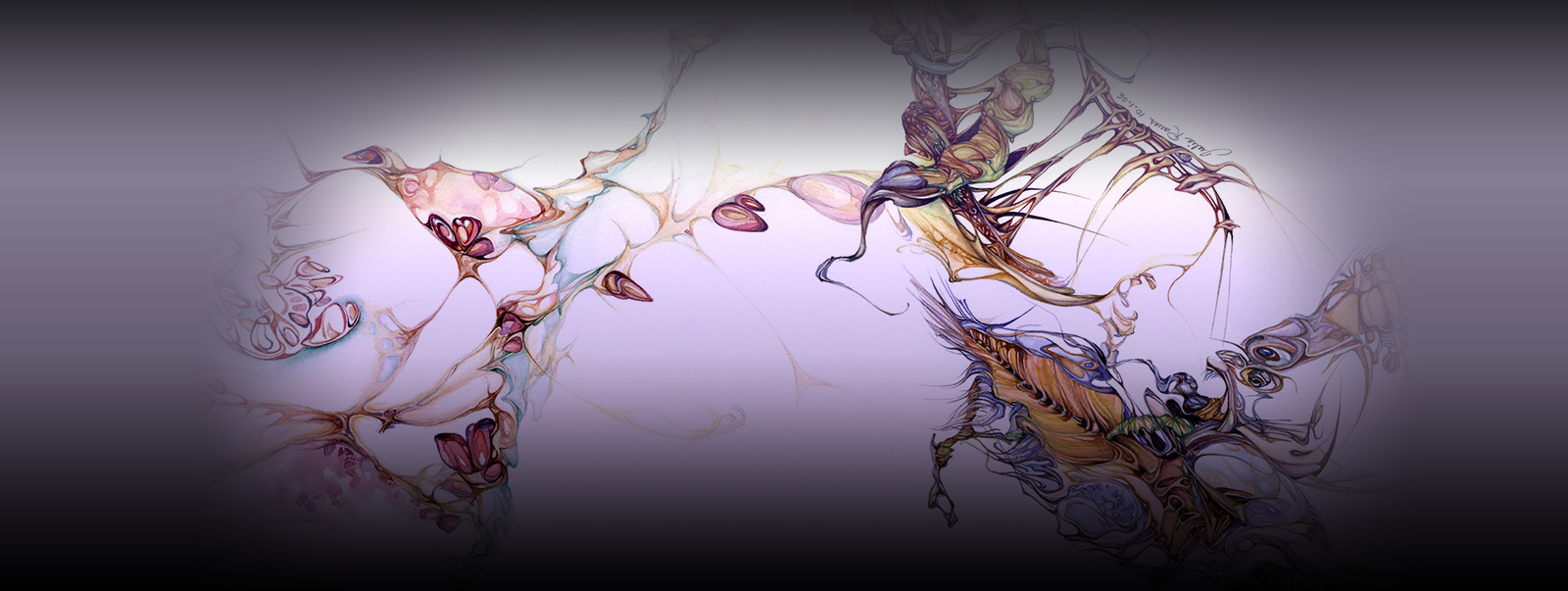A FABLE
Lemur eyes bulged in wet panic, lids peeled back from corneal domes that rolled and clattered against the bridges of identical noses on two men who faced each other on a failing causeway. Tenuous suspension of dissolving units shifted under their feet as each stood in judgment of the other’s cowardice. Apprehension warped the texture of their smooth necks, dissolved stiff collars and waistcoat fibers, gnawing down fine silk flesh of covered buttons to calcified stumps. Both ambassadors were covered with coarse brown hair which began where their barbers had shaved a break line, creating the civilizing distinction of head and neck, and ended at the remotest tips of their toes; neither considered himself hirsute and lived with a constructed air of refined hairlessness, reviling the other for barbarianism masquerading as nobility.
They had never met under favorable conditions, when the country was a wet bivalve mouth of healthy pink, and only came together now out of necessity; each had been sent as an emissary–of desperation and good will–from their respective territories, isolated keeps whose populations would have certainly remained so, had it not been for the heightened occurrences of natural disasters deemed unnatural, destruction by an invisible hand, a common enemy that threatened them all. After mutual assessment of the other’s intentions, veiled and otherwise, authority and influence, both men flushed nauseous celadon with lizard glaze and swelled visibly at the lymph nodes, inflated by renewed suspicions. Gold thread spun into rustic barnyard scenes across their vests began flashing with each elemental revolution of two indifferent minds, each generating columns of preemptive decisions with an accountant’s rapid mathematical apathy. Both men pulsed with vague frustration, in sulphur time with their garments.
If only they could be recalled from this catastrophe, summoned back home to enjoy the many comforts of their esteemed positions: chefs obligated to cook a dozen different sauces for the roasted pheasant in hopes of satisfying bland palates just once, mute drivers to spirit them from place to place, pilfered muscle of bestial soldiers to guard their goose down beds from the wet ground beneath high windows. Deprived of nightly massage and oil dances, baths painfully drawn by arthritic women sprouting ginseng fingers, hand stitched clothes tailored to make physical imperfections into decadent pleats and pockets, and meals that launched them into creamy hours of gourmand slumber, the men saw the futility of their mission. Averting the impending crisis would be impossible, and they were likely to find themselves at numerous philosophical impasses.
Not a single word had passed between them. Resentment surged as each fought to steady himself on fractured ground that began to dissolve in greasy little wells around the poles of their feet. Next to one man’s toes, a knob of white bone poked through the earth, exposed now for the first time; it looked menacing but was only weak lace, a porous extrusion that he crushed easily under his heel. Despite the advancing apocalypse, each was distracted enough to remain wonderfully calm.
Decades before the corrosion began—or was noticed by those who mattered enough to be heard—in the days when populations and their cities were grown on the same bones, there was palpable agitation, a restless ambition of the masses. Primordial soup that knew its future as civilization. Frenetic entitlement created a population of citizens shredded raw with expectation, regardless of impoverished beginnings or the scars inherited from a lineage of debased castes. There was a genetic memory of collective purpose, the innate knowledge amongst even the lowliest of their intrinsic necessity to the vitality of the organism. Laborers, merchants, scholars, nobles, clergy, artisans, warriors—few enjoyed parity in society, yet all bore equal weight in blood.
Beneath the translucent skin of laboratories and studios, travelers could watch insight gather force in constricted vessels, synapses fire in neural fury, connections linking disparate ideologies falter then courageously extend to test the sharpest angles of the creative process. Dissenting thoughts to remake the world over and over again–on paper, canvas, with unsubmissive words, air through reeds and fingers across strings, in dangerous protein models, in structures that set populations on edge with inconceivable anachronism—fed the ganglia of towns and cities with the ardor of contrary thought. Libraries and museums, axons and dendrites, had been lifted from the doldrums of map points and pilgrims’ markers to expand and shudder with passionate habitation.
Opacity arrived one autumn day as an equalizing shroud, mediocre shades of brown leaves without vermilion punctuation or saffron fall. Easy commonality settled over the country, eccentric pathways shriveled and dissolved as a new canon—dulcet coexistence at any cost—rose to rule, elevated to law. One by one, writing desks, easels, studios, and laboratories were eclipsed, discourse muffled and impulses dampened, obscured by a monstrous hide that stunted pathways and segregated lobes, isolated entire districts. It was unhealthy flesh mottled with unnatural geometric birthmarks and marred by clumps of splintered hair, each follicle a bear trap of jagged shafts filling the many holes and lesions that had begun to open in the ground.
Despite the suppurating pits and swollen furrows–rimmed granular umber from the coagulation of fluids–marring their parks and lawns, roads and fields, the population lived in a strictly enforced state of militant ignorance. The smell of decay moved from the front of their noses to the back of their throats, and was swallowed so many times it began to taste like serenity. Mass anxiety diminished to ambient apathy as the relative value of individual connections was weighed and then degraded, each successive disappearance met with increasing acceptance, even slight annoyance, at the inconvenience of circumnavigating great gaps in space. The nation resigned itself to a dreamless sleep, fragmented consciousness living under new skin as lotus eaters dining on sweet forgetfulness, the illusion of waking life. Bloodshot corneal nights of boisterous ambition and rabid thought had been supplanted by the quiet of a scar tissue–invalid roar in jelly—patterns of a collapsed mind seen through the balmy haze of infirmity. Now and then, a hill would shudder with the searching discontent of earlier years before reverting to placid ground.
Travelers passed through tracts of muted land, inhabitants mired in routine and the obsessions of commerce, indifferent to the vanished. From their perches atop horses and carriages, voyagers could still discern the outlines of cluster towns with their unpredictable spikes of refineries, steeples, and chimneys, even as they dissolved into a leper’s blunted profile. Disease offended them: half submerged trees being slowly, painfully digested by cannibal earth; cow back vines hanging between building walls in artery ropes; paving stones glowing with the ghastly inner light of blood blisters; public fountains cut off from the water supply by decay yet still running with vile liquid; window frames purged by apartment blocks before implosion lay scattered across city streets now as random magnifying glasses to amplify the subtle textures of illness over miles of lacerations covering the pavement.
Surface cracks gave the faltering bridge a timeless quality of porcelain imploding from the dignified flaws of age, decorative net of imperfections much admired by the population, which badly needed to believe that beneath the appearance of frailty was an immutable core. A godly root that prevented everything they knew from falling apart. But the span holding the two emissaries rocked with the truth of infirmity. Neither ambassador could deny the peril of the situation; it would surely mean the destruction of cities, obliteration of their world, end of existence. Vital discussion should commence. Decisions would need to be made without delay. Each set narrowed eyes upon the other’s hunched shoulders, arachnid fingers curling and unfolding in wary cadence, spindle legs woven into treacherous rope from constant shifting to steady themselves, as ever larger pieces of the causeway broke away.
Citizens continued to live on stratified decay, caring little, always finding new ways to circumvent collapsed tunnels and disintegrating roadways. Avoidance served them well until inconveniences became impossibilities and each isolated metropolis floated over scavenged earth as an island. Power fluctuated and failed every few days, rendering each week an artificial lunar cycle of compressed day and night. Floods appeared from nowhere to wash away towns, deluges of liquid that were never visible on the horizon, did not originate from oceans, but rather welled up from underfoot to explode with geyser force. Panic followed episodes of unnatural upheaval as habitants and their possessions were carried off. Yet after fear subsided, diminished under the sedative of daily routine and unremarkable thought, the timbre of indifference settled in again and the quiver of life returned to normal.
Both ambassadors still faced each other, in an eclipse of disinterest that rendered two distinct beings as monolithic apathy, on the crumbling bridge, which began to fall away from their bodies into a void. Bone fragments swirled around their legs then rushed their eyes, knives thrown in humanesque patterns at sideshow freaks, a shredding storm that finally spun into a strand of calcified rain and receded into a point singularity. Balanced on the terminus of chalk bulbs, toes clawing porous nodules, their feet stood on all that remained of the infrastructure which had once connected their two cities.
The creature’s spine had finally eroded, nerves severed, impulses extinguished. It had lived in a diseased state for most of its adult life, enduring convulsions and spasms, wild growth of malignant cysts and deformation of bones that had been misinterpreted as ambitious seasons and geological curiosities. As internal structure lost cohesion and function, its skin hung down in long folds for the delight of adventurer tourists who gawked at the wondrous stalactites lining miles of somber, interconnected caves. They came from distant cities to watch unearthly rock formations grow and change color, always magical and surprising, from scarlet hell to luscious plum spotted aphid green to the abyss of black lacquer. Sometimes the igneous cones would expand fitfully and rupture, spraying visitors with putrid liquid that was promptly gathered in tiny glass vials and sold for exorbitant sums.
Parasitic infestation had killed the organism slowly, over many years, the infectious population feasting and thriving on its body. Hair, teeth, and nails fell out as civilization spread over its haunches, raced across disfigured back and penetrated the length of the beast’s spine one vertebra at a time. Sympathetic limbs and digits were excised from the whole, neural appendages set adrift—isolated cities of sheared synaptic connections left to atrophy as grotesquely heretical thoughts slid safely into nonexistence, as the creative mind shut down. The artist gave up her work, relinquished the necessity of a deviant intellect and its ravaging thorns and adopted the tranquility of indolence, the languorous ease of a silent mind.
Copyright © December 17, 2002 – Julie Rauer





COMMENTS
There are no comments yet!